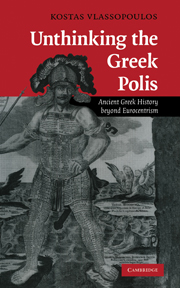Book contents
- Frontmatter
- Contents
- Acknowledgements
- Abbreviations
- Introduction
- PART I DEFINING THE CONTEXTS OF THINKING ABOUT THE POLIS
- PART II RETHINKING THE CONTEXTS. THE POLIS AS AN ENTITY: A CRITIQUE
- 4 East and West, Greece and the East: the polis vs. Oriental despotism
- 5 The consumer city: ancient vs. medieval/modern
- PART III BEYOND THE POLIS: THE POLIS AS PART OF A SYSTÈME-MONDE
- References
- Index
5 - The consumer city: ancient vs. medieval/modern
Published online by Cambridge University Press: 22 September 2009
- Frontmatter
- Contents
- Acknowledgements
- Abbreviations
- Introduction
- PART I DEFINING THE CONTEXTS OF THINKING ABOUT THE POLIS
- PART II RETHINKING THE CONTEXTS. THE POLIS AS AN ENTITY: A CRITIQUE
- 4 East and West, Greece and the East: the polis vs. Oriental despotism
- 5 The consumer city: ancient vs. medieval/modern
- PART III BEYOND THE POLIS: THE POLIS AS PART OF A SYSTÈME-MONDE
- References
- Index
Summary
We can now move to see how the concept of the polis has functioned in discussions of ancient economic history. The debate on the polis as a consumer city is an offshoot of an old discourse. It is based on a certain reading of the history of medieval and modern Europe, and the origins of capitalism and modernity. The central desideratum of this discourse is to explain how Europe moved towards modernity, how capitalism emerged and why previous eras and civilisations, or contemporary non-European ones, failed to move towards modernity and capitalism. There have been of course many answers to these questions; but one that became particularly influential was the idea that it was the medieval European city and its urban classes that opened the path to capitalism and modernity. In this approach, the medieval city, separated from the feudal countryside, as ‘a non-feudal island in a feudal sea’, composed mainly of merchants and artisans, fostered the expansion of trade and manufacture, revolutionised the stagnant countryside, and ultimately led to capitalism and modernity. The work of the Belgian historian Henri Pirenne in the early decades of the twentieth century gave particular prominence to such ideas. The debate has been going on since then, but, as we will later see, this way of looking at the issue, and the viewing of the medieval city as the answer to the question, have been largely discarded.
- Type
- Chapter
- Information
- Unthinking the Greek PolisAncient Greek History beyond Eurocentrism, pp. 123 - 142Publisher: Cambridge University PressPrint publication year: 2007
- 1
- Cited by



